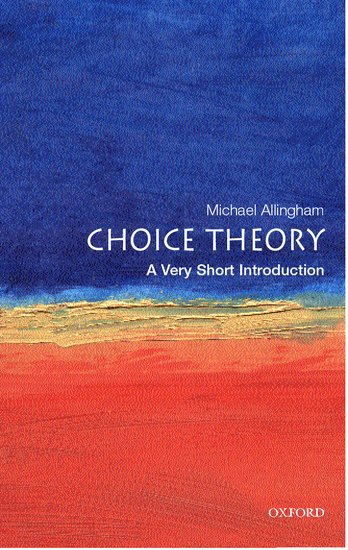Home >
A Very Short Introduction >
Choice Theory (Business & Economics)
A Very Short Introduction | Business & Economics
Choice Theory
ISBN: 9780192803030
Series: A Very Short Introduction
Choice Theory (Business & Economics)
A Very Short Introduction Choice Theory (Business & Economics) Media > Books > Non-Fiction > Education Books Expect Delays of Up to 4 Weeks| Order Below |
ISBN
9780192803030 (10-digit ISBN: 0192803034)
- Description
- Key Features
- Series Description
- Table of Contents
- Lively and thought provoking book about the theory behind making decisions
- Explores what it means to be rational, and what kind of criteria are we applying when we say that a choice is rational
- Examines what it means to choose rationally in various settings: who to spend the rest of your life with, whether to undergo an operation if you are told that the mortality rate is 25 per cent, and whether to travel by air in the face of terrorist threats
- Examines what strategies should be applied in making decisions which affect lots of people, including ways of electing politicians. Should a country develop a nuclear capability when it knows that others face the same choice? What are the relative advantages of 'first past the post' and proportional representation in elections?
We make choices all the time - about trivial matters, about how to spend our money, about how to spend our time, about what to do with our lives. And we are also constantly judging the decisions other people make as rational or irrational. But what kind of criteria are we applying when we say that a choice is rational? What guides our own choices, especially in cases where we don't have complete information about the outcomes? What strategies should be applied in making decisions which affect a lot of people, as in the case of government policy?This book explores what it means to be rational in all these contexts. It introduces ideas from economics, philosophy, and other areas, showing how the theory applies to decisions in everyday life, and to particular situations such as gambling and the allocation of resources.
Oxford's Very Short Introductions series offers concise and original introductions to a wide range of subjects--from Islam to Sociology, Politics to Classics, Literary Theory to History, and Archaeology to the Bible.
Not simply a textbook of definitions, each volume in this series provides trenchant and provocative--yet always balanced and complete--discussions of the central issues in a given discipline or field. Every Very Short Introduction gives a readable evolution of the subject in question, demonstrating how the subject has developed and how it has influenced society. Eventually, the series will encompass every major academic discipline, offering all students an accessible and abundant reference library.
Whatever the area of study that one deems important or appealing, whatever the topic that fascinates the general reader, the Very Short Introductions series has a handy and affordable guide that will likely prove indispensable.
Please note: As this series is not ELT material, these titles are not subject to discount.
1: Choice and desire
2: Reason and rationality
3: Racing and roulette
4: Gambling and insurance
5: Conflict and cooperation
6: Democracy and Dictatorship
We make choices all the time - about trivial matters, about how to spend our money, about how to spend our time, about what to do with our lives. And we are also constantly judging the decisions other people make as rational or irrational. But what kind of criteria are we applying when we say that a choice is rational? What guides our own choices, especially in cases where we don't have complete information about the outcomes? What strategies should be applied in making decisions which affect a lot of people, as in the case of government policy?This book explores what it means to be rational in all these contexts. It introduces ideas from economics, philosophy, and other areas, showing how the theory applies to decisions in everyday life, and to particular situations such as gambling and the allocation of resources.
Key Features
- Lively and thought provoking book about the theory behind making decisions
- Explores what it means to be rational, and what kind of criteria are we applying when we say that a choice is rational
- Examines what it means to choose rationally in various settings: who to spend the rest of your life with, whether to undergo an operation if you are told that the mortality rate is 25 per cent, and whether to travel by air in the face of terrorist threats
- Examines what strategies should be applied in making decisions which affect lots of people, including ways of electing politicians. Should a country develop a nuclear capability when it knows that others face the same choice? What are the relative advantages of 'first past the post' and proportional representation in elections?
Series Description
Oxford's Very Short Introductions series offers concise and original introductions to a wide range of subjects--from Islam to Sociology, Politics to Classics, Literary Theory to History, and Archaeology to the Bible.
Not simply a textbook of definitions, each volume in this series provides trenchant and provocative--yet always balanced and complete--discussions of the central issues in a given discipline or field. Every Very Short Introduction gives a readable evolution of the subject in question, demonstrating how the subject has developed and how it has influenced society. Eventually, the series will encompass every major academic discipline, offering all students an accessible and abundant reference library.
Whatever the area of study that one deems important or appealing, whatever the topic that fascinates the general reader, the Very Short Introductions series has a handy and affordable guide that will likely prove indispensable.
Please note: As this series is not ELT material, these titles are not subject to discount.
EASY ORDER FORM
PRICES LISTED INCLUDE CONSUMPTION TAX
Price Before Tax:
¥1,790


